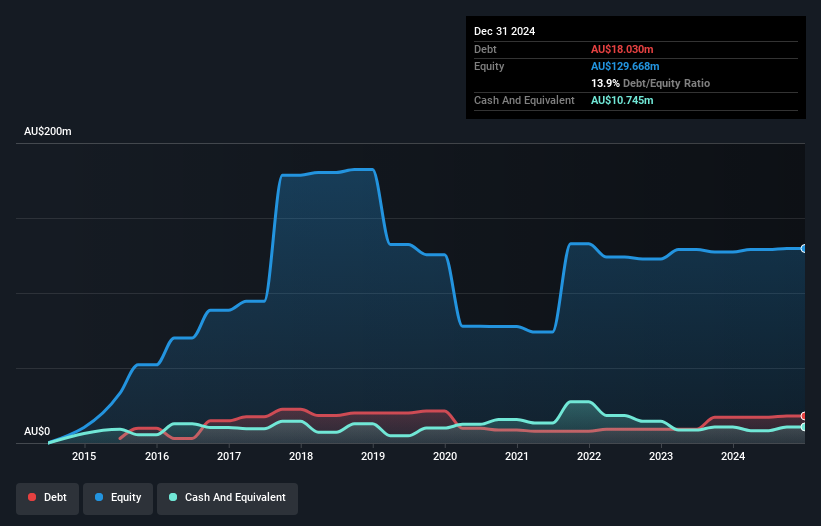David Iben put it well when he said, 'Volatility is not a risk we care about. What we care about is avoiding the permanent loss of capital.' So it might be obvious that you need to consider debt, when you think about how risky any given stock is, because too much debt can sink a company. We note that Experience Co Limited (ASX:EXP) does have debt on its balance sheet. But the more important question is: how much risk is that debt creating?
Our free stock report includes 1 warning sign investors should be aware of before investing in Experience Co. Read for free now.When Is Debt A Problem?
Debt is a tool to help businesses grow, but if a business is incapable of paying off its lenders, then it exists at their mercy. If things get really bad, the lenders can take control of the business. However, a more usual (but still expensive) situation is where a company must dilute shareholders at a cheap share price simply to get debt under control. Of course, plenty of companies use debt to fund growth, without any negative consequences. When we think about a company's use of debt, we first look at cash and debt together.
How Much Debt Does Experience Co Carry?
You can click the graphic below for the historical numbers, but it shows that as of December 2024 Experience Co had AU$18.0m of debt, an increase on AU$17.1m, over one year. However, because it has a cash reserve of AU$10.7m, its net debt is less, at about AU$7.29m.

How Healthy Is Experience Co's Balance Sheet?
Zooming in on the latest balance sheet data, we can see that Experience Co had liabilities of AU$32.8m due within 12 months and liabilities of AU$30.5m due beyond that. On the other hand, it had cash of AU$10.7m and AU$5.89m worth of receivables due within a year. So its liabilities outweigh the sum of its cash and (near-term) receivables by AU$46.6m.
This deficit isn't so bad because Experience Co is worth AU$83.3m, and thus could probably raise enough capital to shore up its balance sheet, if the need arose. But it's clear that we should definitely closely examine whether it can manage its debt without dilution.
See our latest analysis for Experience Co
We measure a company's debt load relative to its earnings power by looking at its net debt divided by its earnings before interest, tax, depreciation, and amortization (EBITDA) and by calculating how easily its earnings before interest and tax (EBIT) cover its interest expense (interest cover). The advantage of this approach is that we take into account both the absolute quantum of debt (with net debt to EBITDA) and the actual interest expenses associated with that debt (with its interest cover ratio).
Given net debt is only 0.67 times EBITDA, it is initially surprising to see that Experience Co's EBIT has low interest coverage of 1.1 times. So while we're not necessarily alarmed we think that its debt is far from trivial. Notably, Experience Co made a loss at the EBIT level, last year, but improved that to positive EBIT of AU$2.2m in the last twelve months. When analysing debt levels, the balance sheet is the obvious place to start. But ultimately the future profitability of the business will decide if Experience Co can strengthen its balance sheet over time. So if you're focused on the future you can check out this free report showing analyst profit forecasts.
Finally, while the tax-man may adore accounting profits, lenders only accept cold hard cash. So it is important to check how much of its earnings before interest and tax (EBIT) converts to actual free cash flow. Happily for any shareholders, Experience Co actually produced more free cash flow than EBIT over the last year. That sort of strong cash conversion gets us as excited as the crowd when the beat drops at a Daft Punk concert.
Our View
Experience Co's interest cover was a real negative on this analysis, although the other factors we considered were considerably better. In particular, we are dazzled with its conversion of EBIT to free cash flow. Looking at all this data makes us feel a little cautious about Experience Co's debt levels. While debt does have its upside in higher potential returns, we think shareholders should definitely consider how debt levels might make the stock more risky. When analysing debt levels, the balance sheet is the obvious place to start. However, not all investment risk resides within the balance sheet - far from it. These risks can be hard to spot. Every company has them, and we've spotted 1 warning sign for Experience Co you should know about.
If, after all that, you're more interested in a fast growing company with a rock-solid balance sheet, then check out our list of net cash growth stocks without delay.
Valuation is complex, but we're here to simplify it.
Discover if Experience Co might be undervalued or overvalued with our detailed analysis, featuring fair value estimates, potential risks, dividends, insider trades, and its financial condition.
Access Free AnalysisHave feedback on this article? Concerned about the content? Get in touch with us directly. Alternatively, email editorial-team (at) simplywallst.com.
This article by Simply Wall St is general in nature. We provide commentary based on historical data and analyst forecasts only using an unbiased methodology and our articles are not intended to be financial advice. It does not constitute a recommendation to buy or sell any stock, and does not take account of your objectives, or your financial situation. We aim to bring you long-term focused analysis driven by fundamental data. Note that our analysis may not factor in the latest price-sensitive company announcements or qualitative material. Simply Wall St has no position in any stocks mentioned.
About ASX:EXP
Experience Co
Engages in the adventure tourism and leisure business in Australia and New Zealand.
Undervalued with reasonable growth potential.
Market Insights
Community Narratives



